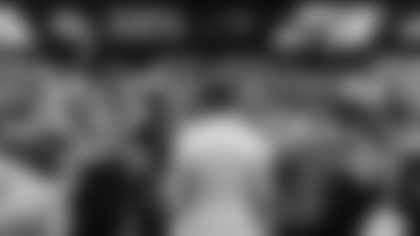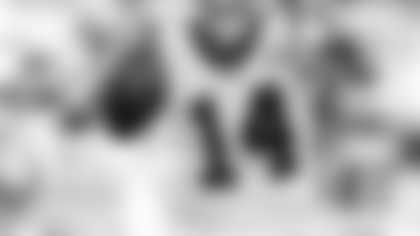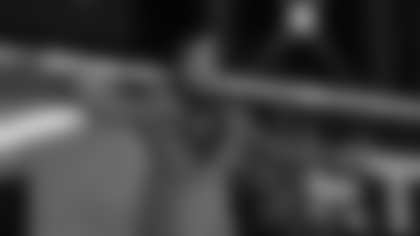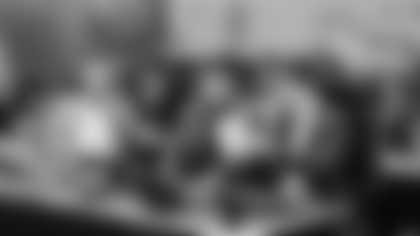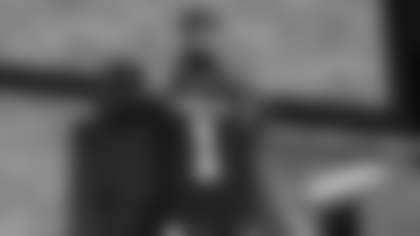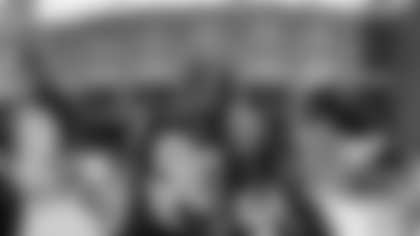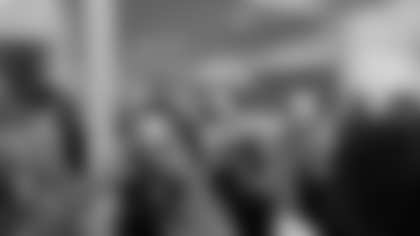CHARLOTTE – Calvin Throckmorton got to Carolina this season with a short turnaround to Week 1, as the Panthers claimed the fourth-year guard off waivers from New Orleans in late August.
Just as quickly, he found a connection to fellow guard Austin Corbett – the right-side starter he has slotted in for along the offensive line while Corbett recovers from an ACL tear.
They stood along the practice sideline on Throckmorton's first day here, talking about the offense and where they went to college. The two realized they had more in common when they started talking about their majors, as they're a pair of NFL offensive linemen with academic interests in biology and orthopedics.
"It's always fun to get some of that same mindset of just kind of like, 'All right, if football works, great. Here's the secondary plan,'" Corbett said. "Awesome to get somebody else in the room that enjoys and is kind of a nerd like myself about all the science stuff."
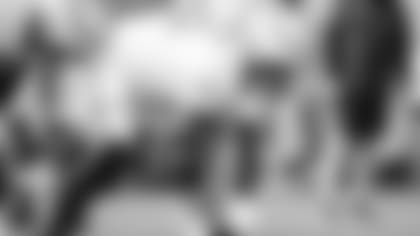
Throckmorton's time doubling as an invested human physiology major and starting offensive lineman at Oregon brought about the nickname "Doc Throck" in the Ducks' locker room. It hasn't been as well-known since his venture into professional football with the Saints and now the Panthers, but the enthusiasm for a field he'd like to dive into after his football career hasn't waned.
"People have mentioned it every once in a while; it's certainly not as big of an aspect in my life anymore because I'm not studying every day, but I try to at least stay close to it," Throckmorton said. "The nickname will pop up every once in a while. It's not as prominent anymore. I've talked to guys about how I was pre-med and things like that, but I don't think that's popped up yet."
Throckmorton's studies still color his perspective and keep him in tune with his body – critical aspects at the front lines of a physical game. He likes to think he knows quite a bit of what he hears athletic trainers say, knowing that's a field he could see himself pursuing after his football days end.
But there are plenty of places he can apply what he knows during his time on the field, too.
"I think it helps in the sense that I feel like I know what my body needs a lot of the time, and I know when things don't feel quite right," Throckmorton said. "Maybe I can put (trainers) in a more specific place based on what I'm feeling or anything like that.
"I think that's where it's helped me in the past four (years), like, I know what's wrong, I know what it needs, and I was like, I'll talk to them about it. Then, hopefully, they (confirm) that. So it makes it easier to work together on things and make sure that the body is as ready as it can be week in and week out."

––
Throckmorton credited his academic background to a natural curiosity nurtured by his family. He said he asked a ton of questions, and his grandfather bought him a book – "How Things Work" – which kept his brain churning in a more scientific method.
He learned that he had a particular interest in the human body and how everything functions within himself, calling it an interest that "never went away."
"I just constantly wanted to learn," Throckmorton said. "The thing that seemed most interesting to me and that seemed like (had an) endless impact on myself was myself and the human body, how we work as a human being."
His football skills grew, too, as he was a consensus three-star offensive lineman prospect out of Newport High School in Bellevue, Washington, nearby Seattle. He committed to play football at Oregon, blocking for future Chargers quarterback Justin Herbert from 2016-19.
While helping lead the Ducks on a four-year build to a Pac-12 title and Rose Bowl win in 2019, Throckmorton was diving deep into his coursework, balancing organic chemistry and biology with learning four offensive line positions and studying opposing defenses.
"Thankfully, I've had a lot of really good role models in my life who have always taught me how to do things the right way," Throckmorton said. "I knew I wasn't going to be able to just put half effort into both things. So I knew I had to give 100 percent effort into both things. That probably limited my ability to do other things outside of that during college, but I really enjoyed both things."
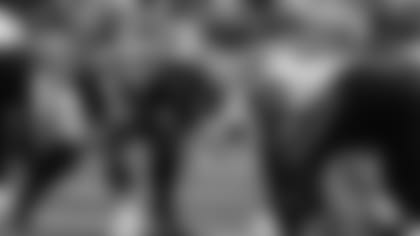
––
Throckmorton is likely one of the few NFL players who can say he has worked in a human cadaver dissection lab.
He said the most interesting class he took at Oregon involved working with a human body from the knee down, a hands-on learning experience that stuck with him.
"Something we were very fortunate to have with the University of Oregon was a human donor lab, so I had a whole course that was human dissection," Throckmorton said. "I got to work on part of a real human body, someone that donated their body to research, science, and the education of people like me. … That was probably the most fascinating course I've ever taken."
Throckmorton said orthopedics has always been where his interest lies, mainly because of the closeness between that field and the football field.
He said he was always chatting with the orthopedic physicians at Oregon while he was in college and even had the opportunity to shadow one for a few weeks there.
"(It was) definitely good, number one, because it would allow me to stay close to sports afterward."
Corbett confirmed the connection between studying the human body and translating that into their play, especially as offensive linemen.
"Our job is our body, so to be able to understand what's going to help it out, what's going to benefit it, what's hurting, understanding just the different biomechanical natures of the offensive line," Corbett said. "Just knowing how to improve those things, how to be more efficient, things that you can train to help that completely agree. Offensive line is so specific, so detailed with our body movements, hand placement, footwork, and everything. It's truly a key."

––
Throckmorton said he has followed the post-football career of former Chiefs guard Laurent Duvernay-Tardif, the fourth NFL player to have graduated from medical school. He studied during Kansas City's offseason and earned a Doctor of Medicine and Master of Surgery in 2018. During the onset of the COVID-19 pandemic in 2020, Duvernay-Tardif returned to his home Canadian province of Quebec to work at CHSLD Gertrude-Lafrance, a long-term care facility in Saint-Jean-sur-Richelieu, Quebec.
It was work that Throckmorton said he admired.
"I've followed him most because I'm half Canadian, and he's Canadian, so that was just like a funny coincidence," Throckmorton said. "But I think it's fascinating and so admirable what he did, especially during COVID and things like that. It's definitely something I want to stay close to, even if it's little things when I'm done with football."
Throckmorton is still weighing exactly what he wants to do within the field once he retires from football, which the 27-year-old isn't looking to do for a while.
But the natural curiosity won't be going anywhere in the meantime.
"I think it just depends on how long I'm playing football," Throckmorton said. "Ideally, I want to play football as long as possible and leave on my own terms at some point. Then, depending on how I feel, maybe it's like, do I still want to do the medical school, doctor, surgeon thing? Or do I maybe want to go more toward physical therapy or other types of therapy, where I could still help athletes and help people improve themselves, get healthy, and things like that?"
The opportunities are there for Throckmorton whenever that door opens.







